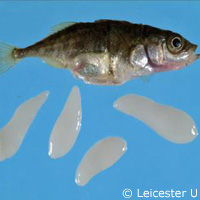Parasites outpace fish as temperatures go up
Climate change is taking a toll on creatures the world over, fish included. A new study from the United Kingdom shows how parasite worms that infect fish are playing havoc with fish reproduction, and how they are growing four times faster at higher temperatures. Presented in the journal Global Change Biology, the findings highlight how global warming has the capacity to unsettle the balance between parasite and host, and could jeopardise fish populations. Researchers from the Department of Biology at the University of Leicester also found the infected fish behaved differently, probably a result of how the parasites are manipulating host behaviour, forcing them to move and seek out warmer temperatures. The study also reveals a slowing down of the host's growth rate, while the parasites grew faster in higher temperatures. 'What we witnessed was that fish infected with the largest worms showed a preference for warmer water, suggesting that these parasites also manipulate the behaviour of host fish in ways that benefit the parasites by maximising their growth rates,' explains Dr Iain Barber of the Department of Biology at the University of Leicester, who carried out the study alongside doctoral student Vicki Macnab. Commenting on the results of the study, Ms Macnab says: 'The research shows a dramatic effect of increased environmental temperatures on the growth rates of parasites in fish hosts. The size these parasites attain in their fish hosts determines how severely fish reproduction is affected, so our results suggest that parasites will have a more serious effect on fish reproduction if temperatures rise. 'In addition, our paper documents behavioural changes in infected fish that suggest the parasites are manipulating host behaviour to make them seek out warmer temperatures, creating a positive feedback mechanism to exacerbate the effects of global warming. This research shows that global warming could shift the balance between parasites and their hosts, with potentially serious implications for fish populations.' According to the duo, the parasitic worms infecting stickleback fish grew four times faster in sticklebacks that were infected in the lab and raised at 20°C compared with a 15°C temperature. It took longer for the fish to grow at the higher temperature. The researchers believe fish parasites are able to deal with the higher temperatures better than can the fish they infect. 'The results are important because the size these parasites attain in their fish hosts also determines their infectivity to fish-eating birds like kingfishers and herons - the next hosts in the parasite's life cycle - and also the number of parasite eggs that they will go on to produce,' says Dr Barber. 'Bigger larval parasites in the fish go on to become larger adult worms in birds, which produce more eggs. After the 8 weeks of the study, all of the worms infecting the fish held at 20°C were ready to infect fish-eating birds, whereas none of those held at the lower temperature had reached a size at which they were ready to be transmitted.' In a follow-up study, the authors also observed that fish infected with the biggest worms preferred to be in warmer water. This finding adds weight to the theory that these parasites also influence the behaviour of host fish in ways that prove advantageous for parasites, and give their growth rates the biggest boost they can get. This study offers us an initial glimpse into how rising environmental temperatures can trigger a shift in the delicate balance that exists between hosts and parasites.For more information, please visit: University of Leicester:http://www2.le.ac.uk/Global Change Biology:http://www.wiley.com/bw/journal.asp?ref=1354-1013
Countries
United Kingdom

